Aluminum castings play a pivotal role in alternative energy or clean energy equipment. Spanning electric vehicle charging stations to wind power turbines to solar panels, aluminum castings are ideal for clean energy equipment.
There are 9 reasons why aluminum castings are used in renewable energy equipment.
Aluminum boasts exceptional thermal conductivity, which can be further enhanced by cast-in design features such as ribs, fins, and pins to help transfer heat.
Aluminum’s efficient heat dissipation is critical for preventing overheating and ensuring safety and reliability of equipment.
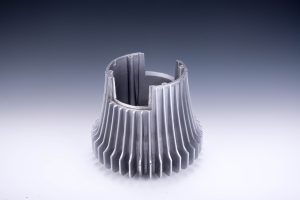
Weight reduction is crucial in electric vehicles, bikes, and other alternative energy products. Aluminum is very lightweight compared to iron, steel, or zinc, making it the material of choice to improve energy efficiency and range.
Wind turbines, solar panels, hydroelectric pumps, and EV charging stations are all outdoor equipment exposed to harsh conditions. Durability is paramount.
Luckily, aluminum castings are naturally rust-resistant. Special coatings and anodizing can add an extra layer of corrosion resistance.
For example, this power supply housing was made to be waterproof and sealed from the environment.
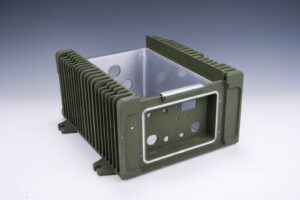
Permanent mold castings are low-porosity. This means dense, pressure-tight products that won’t leak!
EV charging stations, solar panels, and outdoor enclosures must be reliable and last a lifetime. Aluminum castings are known for their durability and low maintenance.
Aluminum castings have a long service life, reducing the need for frequent replacements and maintenance, which is important in remote or hard-to-reach renewable energy installations.
Aluminum’s coefficient of thermal expansion is relatively low, perfect for dimensional stability in the harshest environments.
Aluminum’s coefficient of thermal expansion is similar to that of silicon, which is crucial for ensuring the reliability of solar panels, particularly in extreme temperature variations. This reduces stress, cracking, and maintenance.
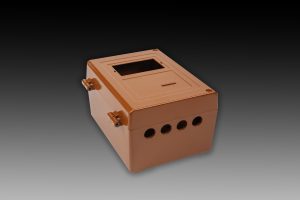
Aluminum can be easily cast into intricate shapes eliminating the need to assemble numerous parts. Engineers have the flexibility to optimize designs thereby enhancing performance and energy efficiency in renewable energy equipment.
Design options include sand cores to create channels, cast-in steel inserts for wires or cooling, raised symbols, and more.
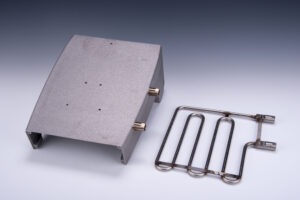
Additionally, aluminum castings provide a modern and sleek look for the energy of the future.
Castings are repeatable, high-precision components. The casting process can be tightly controlled to ensure consistent quality across your product line.
Read more here about permanent mold casting precision and tolerances.
Castings provide streamlined production. For example, this product used in outdoor vending kiosks was once a 12-piece fabrication. Converting to one casting saved time and labor equaling a 40% cost savings!
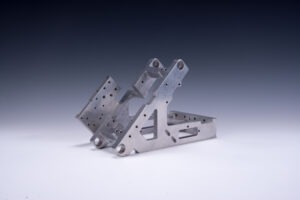
Aluminum castings have superior strength and structural integrity. The crystalline structure of castings can make them more robust and less prone to material weaknesses, such as stress concentration points found in welded fabrications. This is important in moving parts, like wind power applications.
For example, we transformed this fan blade into a permanent mold casting to improve strength and reduce cracking.
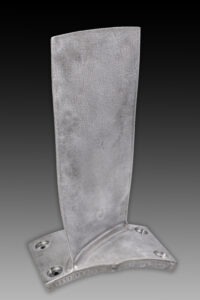
Aluminum castings can be further strengthened through heat treatment.
Aluminum is highly recyclable, and the use of recycled aluminum reduces the environmental footprint, aligning with the sustainability goals of clean energy industries.
At BPI, we cast primary aluminum. Rather than traditional coal burning smelters, our material supplier uses an advanced hydropower damming system to produce aluminum.
When you use aluminum, you don’t waste anything. Aluminum is truly 100% recyclable. In fact, since 1888, when aluminum was first developed, 75% of all the aluminum is still in use today! We recycle all aluminum scrap and chips generated at our facility.
In summary, aluminum castings in renewable energy stations aligns with the eco-friendly image of the clean energy industry, further reinforcing the commitment to sustainability.